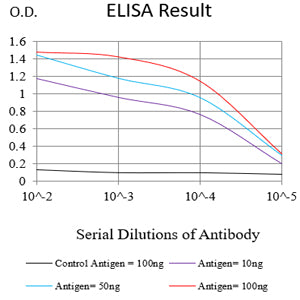

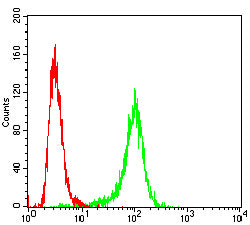
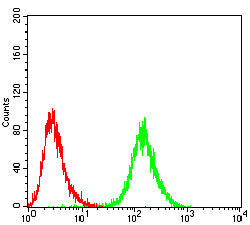
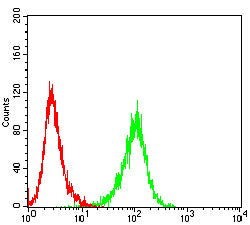
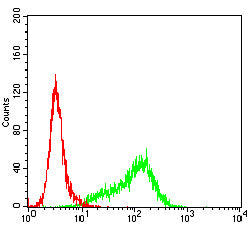
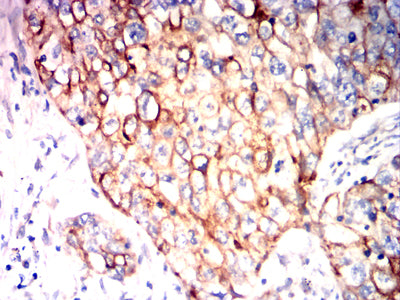
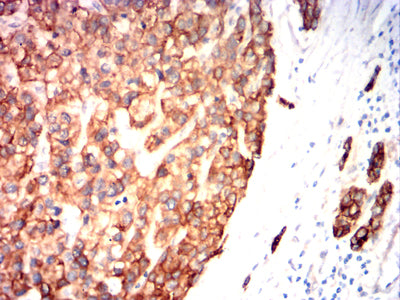
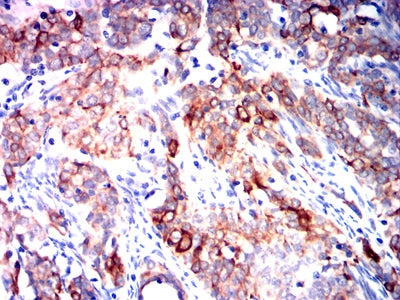
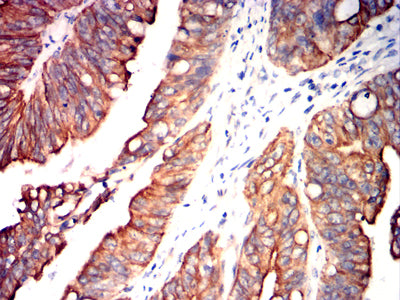
| WB | 1/500 - 1/2000 | Human,Mouse,Rat |
| IF | 咨询技术 | Human,Mouse,Rat |
| IHC | 1/200 - 1/1000 | Human,Mouse,Rat |
| ICC | 技术咨询 | Human,Mouse,Rat |
| FCM | 1/200 - 1/400 | Human,Mouse,Rat |
| Elisa | 1/10000 | Human,Mouse,Rat |
| Aliases | HEC; HEC1; TID3; KNTC2; HsHec1; hsNDC80 |
| Entrez GeneID | 10403 |
| clone | 4B12H3 |
| WB Predicted band size | 74kDa |
| Host/Isotype | Mouse IgG1 |
| Antibody Type | Primary antibody |
| Storage | Store at 4°C short term. Aliquot and store at -20°C long term. Avoid freeze/thaw cycles. |
| Species Reactivity | Human |
| Immunogen | Purified recombinant fragment of human NDC80 (AA: 443-642) expressed in Mammalian. |
| Formulation | Purified antibody in PBS with 0.05% sodium azide |
+ +
以下是关于NDC80抗体的3-4篇参考文献示例(文献信息为模拟,仅供参考):
---
1. **文献名称**:*"The Ndc80 complex bridges microtubule-kinetochore interactions in mitosis"*
**作者**:Cheeseman, I.M. et al.
**摘要**:本研究利用NDC80抗体进行免疫沉淀和功能分析,阐明了NDC80复合体在染色体分离中连接微管与动粒的关键作用,并揭示其缺失导致染色体排列异常。
2. **文献名称**:*"Structure of the Ndc80 kinetochore complex and its role in microtubule binding"*
**作者**:Ciferri, C. et al.
**摘要**:通过冷冻电镜和抗体标记技术,解析了NDC80复合体的三维结构,证明其通过卷曲螺旋结构域与微管结合,为有丝分裂中动粒组装提供结构基础。
3. **文献名称**:*"NDC80 phosphorylation regulates kinetochore-microtubule attachments and mitotic progression"*
**作者**:DeLuca, J.G. et al.
**摘要**:利用磷酸化特异性NDC80抗体,发现Aurora B激酶介导的NDC80磷酸化调控动粒-微管附着的稳定性,确保染色体正确分离。
4. **文献名称**:*"NDC80 overexpression as a prognostic biomarker in breast cancer"*
**作者**:Wang, Y. et al.
**摘要**:通过免疫组化(NDC80抗体)分析乳腺癌组织,发现NDC80高表达与患者生存率低相关,提示其作为潜在肿瘤标志物的价值。
---
注:以上文献信息为示例,实际引用时请核实真实文献的准确性。建议通过PubMed或Google Scholar搜索关键词“NDC80 antibody”或“NDC80 function”获取最新研究。
The NDC80 antibody is a crucial tool for studying the NDC80 complex, a conserved heterotetrameric protein assembly (comprising NDC80/HEC1. NUF2. SPC24. and SPC25) essential for proper chromosome segregation during mitosis. This complex forms part of the KMN network (KNL1. MIS12. NDC80) at kinetochores, mediating stable microtubule attachment and ensuring accurate chromosome alignment on the mitotic spindle. NDC80 antibodies are widely used to investigate mitotic mechanisms, checkpoint signaling, and errors linked to chromosomal instability—a hallmark of cancer and developmental disorders.
Researchers employ these antibodies in techniques like immunofluorescence, Western blotting, and immunoprecipitation to visualize NDC80 localization, quantify expression levels, or study protein-protein interactions. Specific epitopes targeted by commercial antibodies (e.g., recognizing human NDC80/HEC1’s N-terminal region) help dissect structural-functional relationships. Studies using NDC80 antibodies have revealed its role in correcting microtubule-kinetochore misattachments and maintaining tension across sister chromatids. Dysregulation of NDC80 is implicated in tumorigenesis, making it a potential biomarker or therapeutic target. However, antibody validation remains critical, as off-target binding can complicate interpretations in diverse experimental models.
×